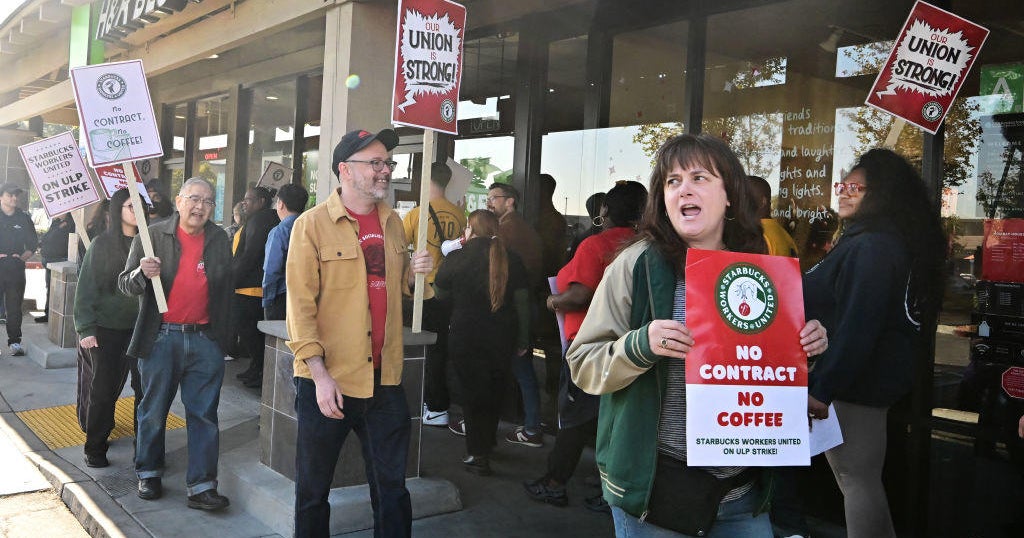Undocumented immigrants risk deportation to protest for rights in France
Paris — Hundreds of undocumented immigrants in Paris are risking deportation to stage protests demanding rights to live and work in France. Inspired by the "Yellow Vest" movement, which sparked large-scale demonstrations for economic reform across the country, the so-called "Black Vests" say they are mistreated by authorities and forced to work without fair compensation because of their immigration statuses.
"France is only afraid of those who demonstrate," Ibrahima Kanute, one of the Black Vest's founding members, tells CBS News. "If you show your anger, you might have a chance."
Kanute fled Mauritania in 2016, saying he faced discrimination from the government. His asylum claim was rejected by the French authorities, but he stayed illegally in the country, meeting other undocumented immigrants and activists in the Paris suburbs, where many live. In March, frustrated by the splintered nature of previous protests, they formed the Black Vests.
The group of about 1,500 undocumented immigrants has staged demonstrations at high-profile locations like the Pantheon, Charles de Gaulle airport, and Paris' La Défense business district. They risk arrest and deportation every time they make their immigration statuses known.
"Problematic" immigration laws
Hundreds of thousands of undocumented immigrants are estimated to be living in France, with many sleeping on the streets in makeshift camps. Last year, the French government received a record 122,743 requests for asylum, according to France's Office of Protection of Refugees and Stateless Persons.
A recent poll indicated that 63% of French people feel there are too many immigrants in the country, and that number was even higher among working class respondents (88%). The sentiments have helped fuel a recent rise in the popularity of far-right politicians and put pressure on the government to respond.
Rights groups say France detained more immigrants than any other European Union nation in 2018, and in April last year, the government passed controversial legislation, which Human Rights Watch called "problematic," shortening the time asylum seekers have to make their applications and file appeals as well as doubling the time the state is allowed to detain people pending deportation, from 45 to 90 days.
While the new law did extend protections for some, including children deemed at risk of sexual mutilation, Human Rights Watch says the net effect was to make it harder on people seeking refuge in the country.
"It is shameful that rather than addressing dire situations faced by many asylum seekers and migrants, France's lawmakers decided to weaken safeguards for asylum," the group said in a statement.
"Risking the fate of deportation"
"When they walk in the street, they can be deported. When they are doing laundry, they are risking the fate of deportation. So why not risk it in a political way that can matter," Laurence Meyer, a lawyer who works with the Black Vests, told CBS News.
Meyer is an attorney in the office of French Member of Parliament (MP) Daniele Obono, who is trying to mediate between the government and the group. Obono sent a letter on the Black Vest's behalf to French Prime Minister Edouard Philippe earlier this year, requesting that he meet with members and grant them rights to live and work in France.
Until that happens, the letter says, they "will continue to mobilize and ask for decent housing and papers for everyone." Philippe has yet to respond, and Meyer continues to offer legal advice and referrals to undocumented immigrants trying to build lives in the country.
"I don't think people can imagine what it means... to go to a demonstration because you know your life is at stake, and being taken by the police, and nobody knows where you are for a while, and then you might not see your son or daughter for a really long time because you can be deported," Meyer tells CBS News. "Although the judicial repression that hit the Yellow Vests was really violent — a lot of them lost a lot — it can't be compared to what the Black Vests are risking when demonstrating."
Kanute says the Black Vests are planning more actions at high-profile locations around Paris in the coming months.
"We have to do it ourselves, we undocumented people," he says. "If we wait… it won't get done."



